Each Heater Cover should have its own name or number to identify it. This makes it easy for you to know what goes where when your order arrives, and it helps me keep track of things in the shop as well. For instance, If you have 3 heater covers going into your Living Room you could name them : Living Room 1, Living Room 2, and Living Room 3. If you have heater covers going into different rooms you could name them Living Room, Dining Room, Kitchen etc..
You can pick from several styles of baseboard heater cover. Choose the design that appeals to you. Also, The standard heater covers vent from the top. If your existing metal cover has a large solid top more than 2″ deep off the wall that may block air flow, and you and you do not want to remove the metal covers entirely then you may need a cover that vents from the front instead of the top. Let me know and I can alter the design to suit your needs. Not Sure What To Do? Contact me and we will sort it out
Our Custom wood heater covers are available in several choices of materials and finish.
Unfinished.
You can choose to have it sent to you sanded, but unfinished, and ready for paint.
Save money by applying the primer and color of your choice yourself.
PLEASE NOTE THAT THE UNFINISHED COVER IS MEANT TO BE PAINTED AND IS NOT SUITABLE FOR STAINING AND APPLYING A CLEAR FINISH.
IF YOU PLAN TO APPLY A CLEAR FINISH TO YOUR HEATER COVER YOU SHOULD USE ONE OF THE HARDWOOD MATERIAL OPTIONS BELOW.
Specify whether the Right End and Left End are Open or closed. If the metal baseboard meets a wall on the left or right end then you should enter an “open end” detail for that end. If the cover does not meet the wall, but instead meets your baseboard moulding, so that the end of the heater cover is visible then specify a “closed end” detail
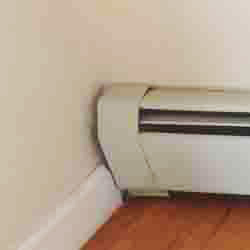
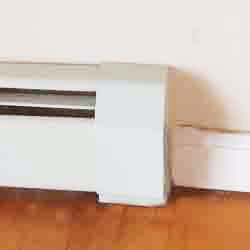
In the section labeled Wall Layout in the order form below, click on the picture that matches the layout of your walls. After you make your selection the appropriate fields will open below it for you to enter the length of the walls. Take extra care if you are ordering a heater cover for an odd niche, or under a Bay window. Click on the section for Bay Windows for more information.
If you do not see a picture that matches the layout of your walls, do not worry. CONTACT ME and I will work with you personally to complete your order.
After you choose your wall layout on the order form, the appropriate fields will open for you to enter the length of your walls. Enter the length of your wall, or walls in inches, written as a decimal, i.e. 50-1/4″ would be entered as 50.25 If the end of the existing metal baseboard cover meets a wall (an open end detail), measure to the wall, if the end of the metal cover does not meet a wall, but instead meets your wooden base moulding (a closed end detail) measure to the edge of the base moulding. The easiest way to do this is to slide the end cap on the metal cover up against the wooden baseboard moulding and measure to the end of the metal end cap. IMPORTANT! The CLOSED END CAPS on the new wooden heater covers are thicker than the existing metal covers and require a space of at least 1/4″ between the side of the heat pipe and the wood base moulding. If you do not have the minimum space you will need to trim the wooden base moulding to allow the end caps to fit. A space of 3/8″ to 1/2″ is ideal. After you trim the base moulding to allow for the end cap, slide the metal cap up against the wood base moulding and measure the new length which includes the space. Another option is to cut a notch the in the side of the endcap so it can be laid over your moulding. If you tell me the size of the notch you need, I will cut it for you.
Our Wooden Baseboard Heater covers can be made any length, but for shipping purposes they are made in sections up to 50″ long. The heater covers are easily joined together on site.


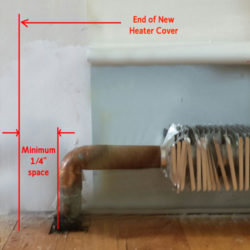
Heater covers often wrap around a corner. Most corners are 90 degrees, sometimes 45 degrees, they can be either an inside corner or an outside corner .
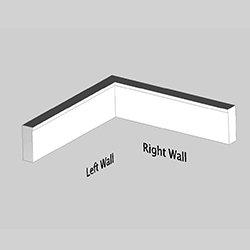
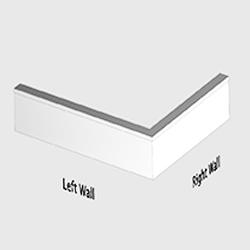
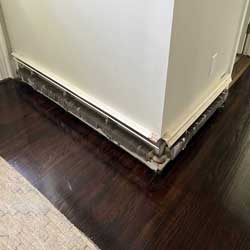
When measuring at an outside corner, measure to the edge of the wall, not the metal cover.
The way baseboard heat is layed out in a home can sometimes be very unique. Here are some common situations and some tips to help you figure out the best way to design your Custom Wood Heater Cover.
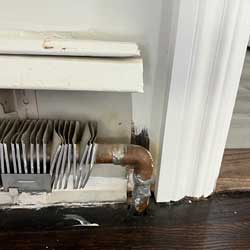
In the photo you see the metal cover (front piece removed) comes almost, but not quite to the door trim on the right. It looks best to have the wood cover meet the door trim without a space, so measure the wall length to the door trim. this would be a closed end. Check for 1/4″ clearance between the copper pipe and the door trim.
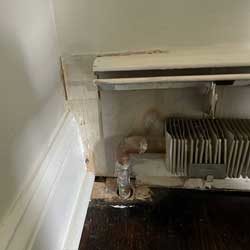
There are 2 ways to handle the detail on the left end of this heater cover. You could specify a closed left end, and measure the the end of the metal cover. But this would leave a space that looks too small between the heater cover and the wall, also in this case you would need to repair the rough wall alongside the heater cover as it would show. A better way to treat this case would be to extend the heater cover further left, until it meets the wall, and specify an open end. However if you do this you will need to either trim the baseboard moulding on the left hand wall, or trim the front of the heater cover to meet the base moulding. I would trim the base moulding, it will give you a clean built-in look.
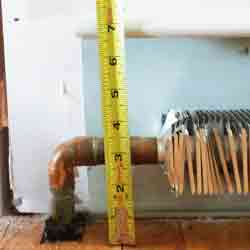
Enter the height in inches from the floor to the top of the existing metal heater cover. Enter the height as a decimal. I will add 1/4″ to this number so there is a little space between the metal cover and the bottom of the new wood heater cover. The height in the photo is 7″ exactly so you would enter 7.0 Measure the height in several places and enter the greatest height.
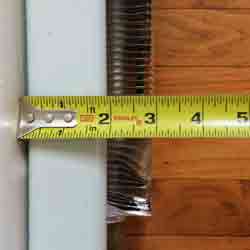
Enter the distance in inches from the wall to the front of the metal heat fins. The depth in the photo is 2-7/8″ or 2.875, but it would be wise to add a little “breathing room” I would increase the depth to 3.0 I will add 1/4″ to the number you give me to add a little space between the metal fins and the wood heater cover. Measure the depth in several places and enter the greatest depth.
Our heater covers look amazing under a bay window. If you are ordering a baseboard heater cover to fit under a bay window, take a few minutes to determine the correct details so that your covers will fit properly. In particular you need to determine 2 things.
1 . After you choose the style of heater cover and the material or finish you want on the order form, Browse the “Wall Layout” section and
Choose the wall layout that matches your needs. This will open the correct lines for you to enter the length of the walls that will be covered by your new heater cover. The baseboard heat in your bay window may be laid out in a number of ways. I have given selections for all the common scenarios. If you do not see a good fit for your needs Contact Me, I will work with you to quickly design a solution for you.
2 . Determine if your bay window has 30 degree angle walls or 45 degree angle walls. Click the buttons to download and print drawings which you can use to determine which type of bay window you have.
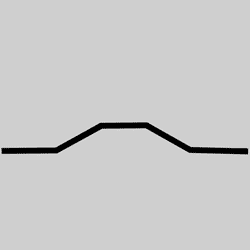
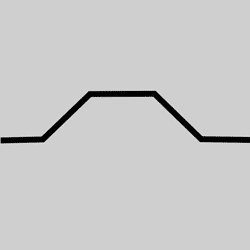
After adding the details of your order in the order form, click the “Add to Cart Button” You will be taken to your shopping Cart and you can verify the details as well as see the shipping cost for your order. If you are not taken to your shopping cart after clicking “add to Cart” take a look at your order form again, some fields are required and if you forget to enter a choice the form will not go to your cart until you correct it. They will be highlighted in red. If you want to order more than one heater cover click the back button in your browser, or the product image in your shopping cart order details, to return to the product order form, then enter the details for your next heater cover and add it to your cart, the same way as the first cover.
You can order any number of Heater Covers on the same order. However, they must be added to the shopping cart one at a time. After you have added the first heater cover to your shopping cart, click the back button in your browser or the product image to return to the product order form, then enter the details for your next heater cover and add it to your cart, the same way as the first cover.
If you are near enough to our shop in Montgomery, NY, you can select local pickup as a shipping option in the shopping cart and you will not be charged shipping; you will however be charged NY sales tax. I will send you an email to arrange pickup when your order is ready.
If you pick up your heater covers can be made in sections longer than 50″.
Our Wooden Baseboard Heater covers can be made any length, but for shipping purposes they are made in sections up to 50″ long. The heater covers are easily joined together on site.